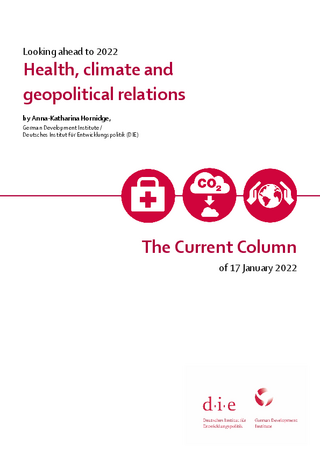Looking ahead to 2022
Health, climate and geopolitical relations
Hornidge, Anna-KatharinaThe Current Column (2022)
Bonn: German Development Institute / Deutsches Institut für Entwicklungspolitik (DIE), The Current Column of 17 January 2022
‘Only at the end of a year do you know how it started.’ With this Friedrich Nietzsche quote, popular around New Year, in mind, how do we look at 2022?
We have already had a mixed start to the year. A new German Government is offering a fresh departure. Germany’s G7 Presidency in 2022 and the NATO-Russia talks point to an openness towards transregional dialogue. At the same time, attacks on democracy and freedom of expression in Hong Kong, Russia and Kazakhstan serve as a reminder of serious value and system differences that call into question a willingness to engage in dialogue and joint initiatives.
DIE’s first Current Column of 2021 provides cause for further reflection. There was talk of 2021 being a ‘super year’ in which major international environmental- and climate-policy events would coincide with efforts to combat COVID-19. The Glasgow climate talks focused not on ‘whether’, but on ‘how’ climate neutrality could be achieved, yet the resulting pledges are insufficient. There was barely any progress with biodiversity policy and COVID-19 still rages on. Looking back, we can see that, while 2021 got off to an expectant, ambitious and optimistic start, it was no ‘super year’.
2022 is set to be dominated by three global tasks: (a) the fight against the COVID-19 pandemic, (b) the climate-stabilising redesign of our economic and social systems, and (c) the negotiation of a multi-polar and rule-based world order.
Access to COVID-19 vaccines and financial assistance for the economic recovery continues to differ depending on region, economic power and social group. The probability of individuals having had access to at least one vaccine dose stands at between 70% and 75% in Europe and North America, compared with 14% in Africa. New variants of the virus continue to emerge, while global cooperation remains insufficient. Helpful lessons have been learned for dealing with Omicron, including the use of vaccines, masks and social distancing to mitigate risk. However, some learning deficits are becoming clear, including the premature closure of borders, with grave consequences for sub-Saharan African economies, despite the fact that Omicron had already been detected in Europe. An ‘us-against-them’ mentality is taking precedence over a joint crisis management approach.
The same applies to the climate-stabilising redesign of our energy and production systems, only achievable through global cooperation. Nonetheless, the raising of ambitions in Glasgow, national long-term strategies and voluntary commitments by the private sector will only limit global warming to 2.4°C. We still require a 45% or so reduction in global greenhouse gas emissions by 2030 for the 1.5°C path. This will only be possible with a rapid redesign of the world’s energy and production systems. At the same time, failure to take decisions with regard to climate-related loss and damage in the climate negotiations is further hampering international dialogue.
The third key challenge, related to climate policy and global management of the COVID-19 crisis, consists of safeguarding a multi-polar and rule-based geopolitical world order, despite differences with regard to values and regime types. The withdrawal from Afghanistan, Crimea, Nord Stream 2 and human rights abuses in China all represent contestations over who determines and actively shapes the future and keeps it open for coming generations. Despite differences, we need to engage in dialogue in order to safeguard and substantially expand our collective ability to take action and make an impact in terms of tackling the pandemic and the climate crisis. This requires consensus on common goals, mutual respect, and strong regional and multilateral institutions.
With 2022 having just begun, what do we hope and expect to be able to say about it in December?
We will be relieved to see that the G7 countries’ decision to place the focus on tackling the pandemic, the climate crisis and transregional dialogue has facilitated and accelerated a globally equitable ‘recover forward’. An increasing number of COVID-19 finance pledges will have been made for the climate-stabilising and socially-just redesign of the economy. The global vaccination rate will have reached 90%. The development and spread of new virus variants will have been curbed.
Thanks to preparations by the G7, the G20 and the G77+China, decisions on loss and damage will have been made at November’s COP27 climate negotiations in Sharm el Sheikh, and work commenced to implement them.
Geopolitical dialogue as part of Germany’s 2022 G7 Presidency and efforts to build bridges with the G20 under Indonesia’s Presidency will have strengthened regional and multilateral institutions in their ability to effectively tackle the pandemic and the climate crisis. February’s AU-EU summit will have enabled the joint formulation of transformation areas for partnership-based dialogue, and the Team Europe initiatives and approach at EU level will have increased the effectiveness of European foreign policy.
2022 is the year for overcoming the pandemic, ensuring the socially-just and climate-stabilising transformation of our economic and social systems, and making significant headway with negotiations on a multi-polar and rule-based world order. We should keep our hopes high and invest all our energies to this end. It is another ‘super year’.
Anna-Katharina Hornidge is the Director of the German Development Institute / Deutsches Institut für Entwicklungspolitik (DIE) and Professor of Global Sustainable Development at the University of Bonn.


